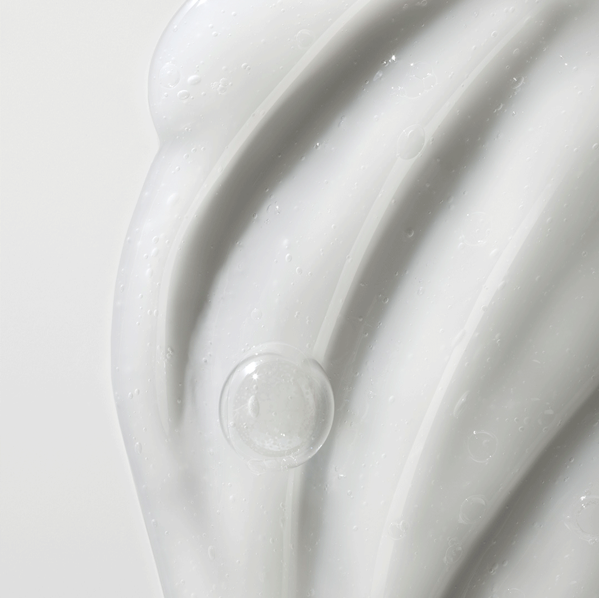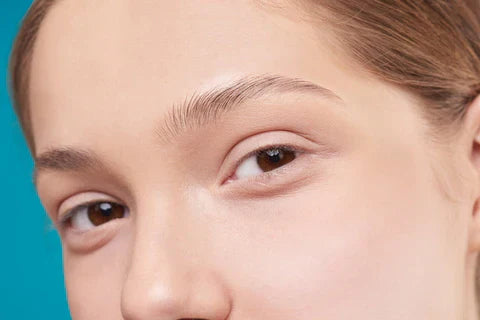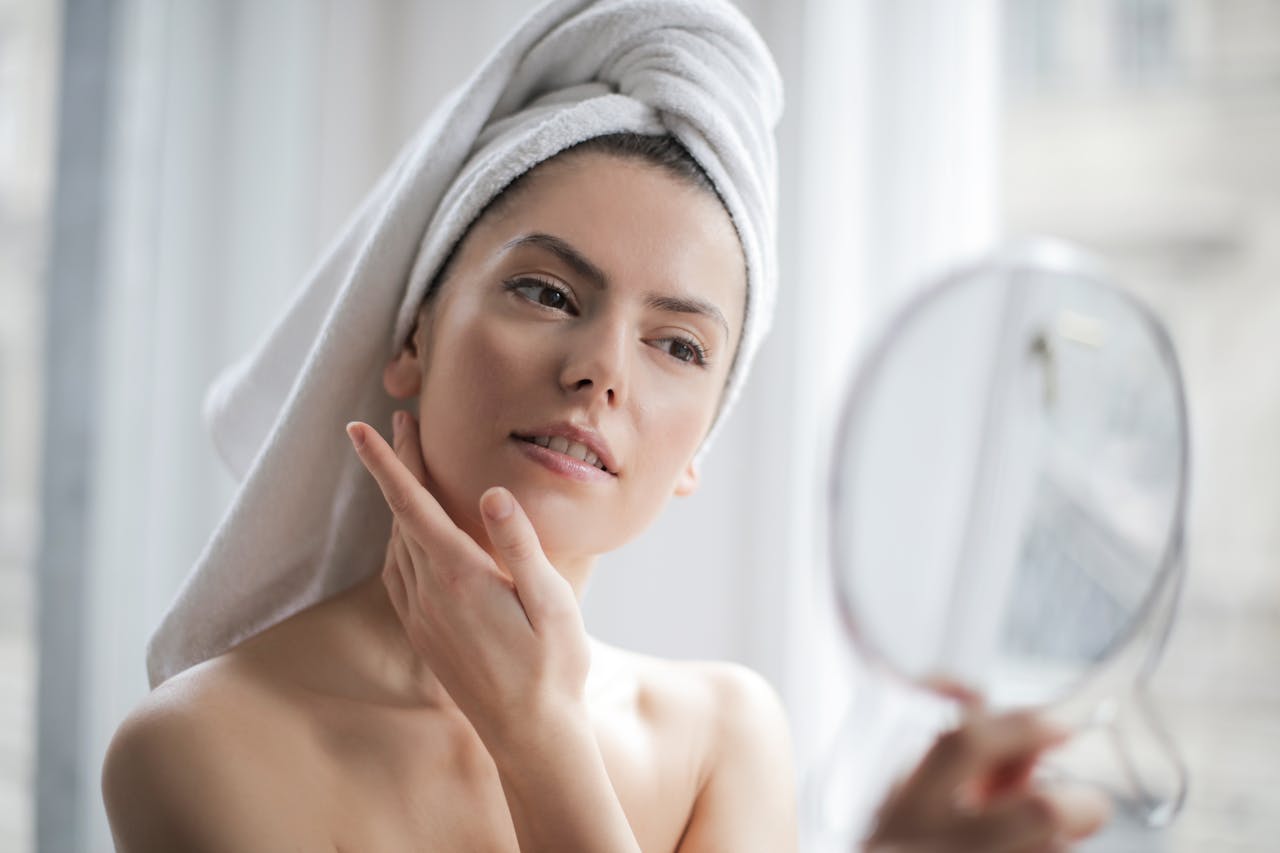It’s official: menopause is hot (and not just because of the hot flashes). This transformative life stage has shed its taboo status, evolving into a topic of widespread discussion and media coverage, and a proliferation of books, articles, and podcasts dedicated to this once hush-hush subject.
Actor Halle Berry has been instrumental in this shift, pushing for legislation to fund menopause research and education, proclaiming that ‘the shame has to be taken out of menopause’. A groundswell of change has even recently spurred many workplaces to implement menopause policies, ensuring support for their staff.

The beauty industry has also responded, launching skincare products specifically designed for peri-menopausal and menopausal women. These products, ranging from cleansers and moisturizers to serums, aim to address the signs of aging linked to hormonal changes.
But which products and, more specifically, which ingredients will really benefit your skin at this stage of your life? Here, we look at the impact of menopause on the skin and explore effective strategies to manage the skin changes you’re facing.
What happens to skin during menopause?
More than one million women in the United States experience menopause annually. By 2025, the North American Menopause Society estimates there will be 1.1 billion postmenopausal women worldwide. That means over a billion women globally will experience skincare issues.
As menopause sets in, hormonal shifts, particularly the decline in estrogen, can potentially wreak havoc on your skin. These changes often result in reduced collagen production, decreased elasticity, and lower moisture retention. The skin’s natural barrier weakens, leading to common concerns such as:
- Acne: hormonal fluctuations can trigger breakouts.
- Dryness and itchiness: loss of natural oils and moisture makes skin parched and itchy.
- Thinning: reduced collagen can cause the skin to become thinner and more fragile.
- Wrinkles and sagging: lack of elasticity contributes to fine lines and sagging.
- Heightened sensitivity: the skin becomes more reactive and sensitive to external irritants.
Which skincare ingredients are best for the menopause?
Although these skin changes may seem challenging, there are positive aspects to embrace. This phase can be an excellent opportunity to revitalize your skincare routine and focus on nourishing your skin in new and effective ways.
As your skin’s needs evolve, you may even discover the benefits of high-quality skincare products you hadn’t explored before. Certain ingredients can make a significant difference in managing menopausal skin. Let’s meet some of your skin’s new best friends:
- Hyaluronic acid: boosts moisture retention and plumps the skin.
- Retinoids: promote cell turnover and collagen production, helping to reduce wrinkles and improve skin texture.
- Antioxidants: combat free radicals and protect the skin from environmental damage.
- Peptides: support collagen production and improve skin firmness.
Does menopause cause acne?
It depends. The shift in hormones can sometimes result in a clearer complexion for those who struggled with acne in their younger years. This is because the decrease in sebum production may lead to fewer breakouts, giving your skin a smoother appearance.
While some may leave their breakouts in the past, many women experience adult-onset acne as a part of their hormonal aging process. Perimenopausal hormonal fluctuations can alter the skin’s oil chemistry, leading to adult acne. As estrogen levels begin to decline in the years leading up to menopause, androgen (a male sex hormone) levels become more dominant, often resulting in unexpected breakouts.
Treat blemishes with La Roche-Posay Effaclar Duo, a dual-action blemish and acne cream that targets individual spots and tackles blackheads, providing clearer skin in less than three days.

If your acne gets worse or you experience scarring, it’s essential to consult a professional for an accurate diagnosis and tailored treatment plan. Whatever you do, don’t worry: with the right approach, adult acne can be effectively managed and treated.
Does menopause cause itchy skin?
During menopause, your body’s estrogen levels drop, and this hormone is crucial for keeping your skin hydrated and elastic. It’s key to the production of collagen and our skin’s natural oils. Healthy joints, skin elasticity and plumpness rely on collagen, which is in our bones, muscles and skin.
With less estrogen, your skin can become thinner and drier, making it more prone to irritation and some strange itchy, prickly and even skin-crawling sensations. There are ways to combat these changes. A good skincare routine that focuses on hydration can make a big difference. Think about incorporating rich moisturizers, gentle cleansers, and products with hyaluronic acid to keep your skin supple.
How to adapt your skincare in menopause
Adapting your skincare routine during menopause is essential to address the unique changes your skin undergoes during this transformative phase. Here are some tailored strategies to help you maintain healthy, radiant skin.
1. Cleanse gently
Opt for mild, hydrating cleansers that preserve the skin’s natural oils. Under Skin Perfect Gentle Cleanser and Revision Brightening Facial Wash are excellent choices for a thorough yet gentle cleanse.
2. Exfoliate wisely

Exfoliation is crucial for removing dead skin cells and promoting cell turnover, but it’s important to choose gentle exfoliants. Opt for alpha hydroxy acids (AHAs) like glycolic or lactic acid, which can help improve skin texture without causing excessive dryness or irritation. We love SkinMedica AHA/BHA Exfoliating Cleanser, which reduces the appearance of wrinkles and enhances skin texture. We recommend you start exfoliating just 1-2 times per week and slowly increase where necessary and if your skin tolerates it.
3. Moisturize deeply
Menopause often leads to drier skin due to reduced estrogen levels. Opt for rich, hydrating moisturizers that contain ingredients like hyaluronic acid and glycerin, like La Roche-Posay Toleriane Double Repair Moisturizer. These ingredients help to lock in moisture and maintain the skin’s barrier.

Consider integrating products like the La Roche-Posay Hyalu B5 serum, which is packed with hyaluronic acid, into your daily routine, or adding in Restorsea PRO Intensive Treatment 10x Serum for intensive care.
4. Use sunscreen religiously

Protecting your skin from UV damage is more important than ever. Use a broad-spectrum sunscreen with at least SPF 30 daily – like EltaMD UV Clear SPF 46 Tinted Sunscreen (there’s also an untinted version) – even on cloudy days. This helps prevent further skin aging and protects against skin cancer.
5. Treat accordingly
Incorporate treatments that address specific menopausal concerns. Retinoids, for example, can help reduce the appearance of fine lines and improve skin texture. However, they can be drying, so it’s crucial to use them in conjunction with hydrating products. Lighthouse offers a range of products designed for aging and mature skin, such as the Revision C+ Correcting Complex and the Revision Revox Line Relaxer.

Skincare in menopause: what to focus on
Skincare is just one part of the equation. Embracing this new chapter allows for a holistic approach to beauty and wellness. Focusing on a balanced diet, proper hydration, and regular exercise can all contribute to healthier, more radiant skin. This period of change can be a time of renewal, encouraging you to invest in yourself and your well-being in meaningful ways.
Eat well
Your skincare routine isn’t just about what you put on your skin. A balanced diet rich in antioxidants, vitamins, and omega-3 fatty acids can support skin health from the inside out. Natural sources of vitamin C, antioxidants and omega-3, such as mango, pomegranate and flaxseed, are a winner for counteracting menopause symptoms.
Hydrate
To hydrate dry skin from the inside out, we recommend the ‘eat your water’ approach. Eating foods that are rich in structured water, especially raw fruits and vegetables, will not only help your body hold onto water longer, you’ll get the added boost of important antioxidants, fiber and other nutrients. Don’t forget to drink plenty of H2O, too.
Reduce stress
Being a menopausal woman can be demanding. You might find yourself juggling a senior-level career, caring for elderly parents, and parenting school-age children or teenagers. Balancing these responsibilities can be overwhelming, making it crucial to carve out time for yourself.
To manage stress and maintain your well-being, incorporate practices such as mindfulness, meditation, or yoga into your routine. These activities can help you stay centered and replenish your energy, ensuring that you can continue to support others while also savoring life’s joys.
Sleep
Sleep is crucial for menopausal skin because it plays a vital role in skin repair and regeneration. During deep sleep, the body’s production of growth hormones increases, facilitating the repair of damaged cells and the formation of new ones.

This process helps maintain skin elasticity and hydration, both of which are often compromised during menopause due to declining estrogen levels. We recommend that where possible, you sleep on your back.
Move
Movement is essential for menopausal skin as it promotes blood circulation and oxygen delivery to the skin cells, aiding in the removal of toxins and the delivery of nutrients. Regular exercise stimulates the production of collagen and elastin, which are essential proteins for maintaining skin elasticity and firmness. Additionally, physical activity helps reduce stress levels, which can have a positive impact on skin health by minimizing inflammation and breakouts.
Seek professional guidance
It’s also a great idea to consult a dermatologist. They can recommend specific treatments and products tailored to your skin’s needs, helping you stay comfortable and maintain healthy skin through this phase of life.
Lighthouse provides access to dermatologists online from anywhere in the country. Our dermatologists provide specific skin care advice and recommend products used and trusted by dermatologists that are typically only available in physicians’ offices and medical spas. Tell us about your skin and our dermatologists will create a personalized skincare routine just for you.
Listen to your skin
Pay close attention to how your skin responds to different products and treatments. Adjust your routine as needed to ensure your skin remains balanced and comfortable.
Navigating the skin changes that come with menopause doesn’t have to be daunting. By understanding the impact of hormonal shifts and adapting your skincare routine with targeted products and lifestyle changes, you can maintain a healthy, vibrant complexion. Embrace this new chapter with confidence and let your inner beauty shine through with the right care and support.
Reviewed by Dr. Katharine Saussy, MD, FAAD (@drsaussy)





